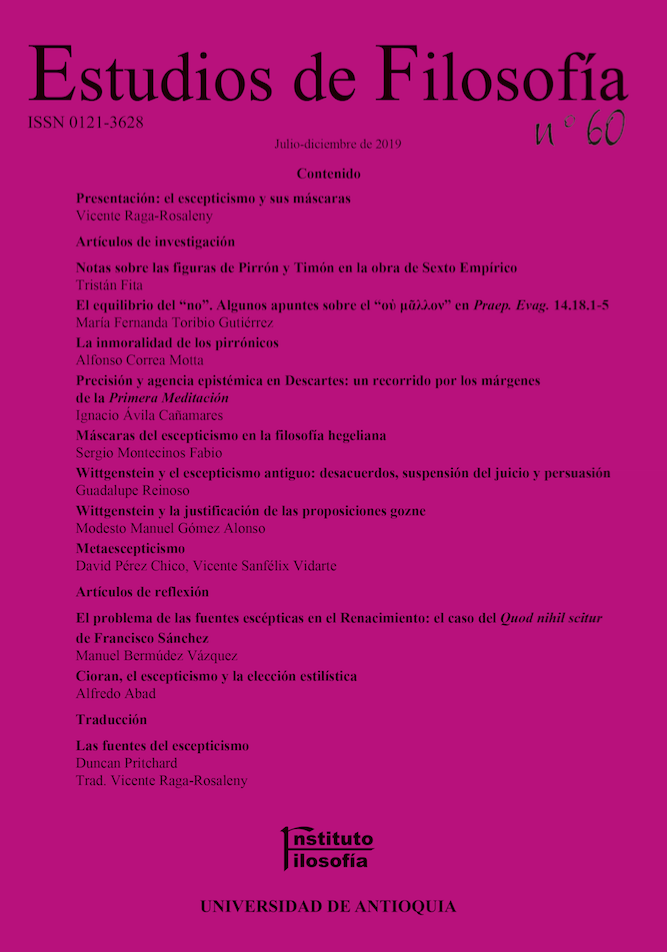Wittgenstein y la justificación de las proposiciones gozne
DOI:
https://doi.org/10.17533/10.17533/udea.ef.n60a08Palabras clave:
constitutivismo, escepticismo semántico, justificación racional, presuposición arbitraria, primacía de la práctica, Wittgenstein, epistemología de goznesResumen
Las cuestiones acerca de la posibilidad del pensamiento, entendido como una actividad dirigida a la realidad, son más profundas que las referidas a si el conocimiento es posible. El trilema de Agripa, particularmente mediante el tropo de arbitrariedad, expresa dichas cuestiones intuitivamente. Este tropo es, además, operativo en lo que se refiere a la epistemología de goznes, principalmente en virtud del hecho de que los goznes wittgensteinianos son principios fundacionales de nuestra práctica epistémica. Como tales, carecen necesariamente de aval racional, lo que plantea el problema de si la arbitrariedad de su aseveración es inherente a su carácter fundacional. Para afrontar este reto, los epistemólogos de goznes han propuesto una serie de argumentos prácticos que conciben los goznes bien como postulados que se exigen legítimamente a cualquier agente epistémico o como reglas constitutivas de la práctica ordinaria. El objeto de este trabajo es el de demostrar que tales argumentos son presa de consideraciones escépticas.
Descargas
Citas
Barnes, J. (1990). The Toils of Scepticism. Cambridge, Cambridge University Press.
Coliva, A. (2015). Extended Rationality: A Hinge Epistemology. Basingstoke, Palgrave.
Cook, J. W. (1985). The Metaphysics of Wittgenstein’s On Certainty. Philosophical Investigations, 8(2), 81-119.
Cook, J. W. (1994). Wittgenstein’s Metaphysics. Cambridge, Cambridge University Press.
Fichte, J.G. (1988). Early Philosophical Writings. Ithaca & London, Cornell University Press.
Plato. (2014). Theaetetus. Oxford, Oxford University Press.
Pritchard, D. (2016). Epistemic Angst: Radical Scepticism and the Groundlessness of Our Believing. Princeton & Oxford, Princeton University Press.
Schmitz, B. (2006). Grammatical Propositions. En Michael Kober (Ed.), Deepening Our Understanding of Wittgenstein (pp. 227-49). Amsterdam & New York, Rodopi.
Sosa, E. (2011). Knowing Full Well. Princeton and Oxford: Princeton University Press.
Sosa, E. (2015). Judgment and Agency. Oxford, Oxford University Press.
Waismann, F. (1979). Wittgenstein and the Vienna Circle. Oxford, Blackwell.
Wittgenstein, L. (2004). On Certainty. Oxford, Blackwell.
Wright, C. (1991). Scepticism and Dreaming: Imploding the Demon. Mind, 100, (397), 87-116.
Wright, C. (2004). Wittgensteinian Certainties. En Dennis McManus (Ed.), Wittgenstein and Scepticism (pp. 22-55). London & New York, Routledge.
Wright, C. (2012). Replies Part IV: Warrant Transmission and Entitlement. En Annalisa Coliva (Ed.), Mind, Meaning, and Knowledge: Themes from the Philosophy of Crispin Wright (pp. 451-86). Oxford, Oxford University Press.
Publicado
Cómo citar
Número
Sección
Categorías
Licencia
Derechos de autor 2019 Modesto Manuel Gómez Alonso

Esta obra está bajo una licencia internacional Creative Commons Atribución-NoComercial-CompartirIgual 4.0.
Los autores que publican en Estudios de Filosofía acuerdan los siguientes términos:
1. El Autor retiene el copyright del "Artículo", por el cual se entiende todos los objetos digitales que pueden resultar de la subsiguiente publicación o distribución electrónica.
2. En conformidad con los términos de este acuerdo, el autor garantizará a Estudios de Filosofía como Editor el derecho de la primera publicación del artículo.
3. El Autor le concederá al Editor un derecho perpetuo y no-exclusivo, así como una licencia de la misma clase, de publicar, archivar y hacer accesible el Artículo parcial o totalmente en todos los medios conocidos o por conocerse, derecho y licencia que se conocen como Creative Commons License Deed. Atribución-No Comercial- Compartir igual CC BY-NC-SA o su equivalente que para efectos de eliminar toda duda, le permite a otros copiar, distribuir, y transmitir el Artículo bajo las siguientes condiciones: (a) Atribución: Se deben reconocer los créditos de la obra de la manera especificada por el Autor a Estudios de Filosofía, pero no de una manera que sugiera que tiene su apoyo o que apoyan el uso que hace de su obra. (b) No Comercial: No se puede utilizar el Artículo para fines comerciales.
4. El Autor puede realizar otros acuerdos contractuales no comerciales para la distribución no exclusiva de la versión publicada del Artículo (v. gr. ponerlo en un repositorio institucional o publicarlo en un libro) con la condición de que haga el debido reconocimiento de su publicación original en Estudios de Filosofía.
5. A los Autores se les permite y Estudios de Filosofía promueve publicar en línea (online) la versión pre-impresa del Artículo en repositorios institucionales o en sus páginas web, antes y durante la publicación, por cuanto que puede producir intercambios académicos productivos, así como una mayor citación del Artículo publicado (ver The Effect of Open Access). Dicha publicación durante el proceso de producción y en la publicación del Artículo se espera que se actualice al momento de salir la versión final, incluyendo una referencia a la URL de Estudios de Filosofía.















